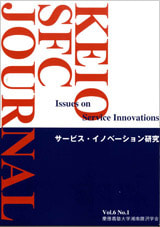- HOME
- KEIO SFC JOURNAL
- Vol.5 No.1

-
Linguistic Diversity and Multilingualism in Information Society − Bridging the linguistic digital divide
Keisuke Kamimura Doctoral Program, Graduate School of Media and Governance, Keio University This article presents a theoretical framework to discuss the issue of software localization from a perspective of language planning. Secondly, it provides analysis on the status of software localization to show that the difference among languages in the extent to which localization is achieved is not attributed to technological and economic factors alone. Thirdly, the article provides a language planning model to intervene into the processes for software localization, followed by a study on one of the interventional measures, to conclude with discussion on the effectiveness and future issues of these interventional measures.
Download this article (PDF):SFCJ5-01.pdf -
A Research of Junji Nishime − The thought such as "the Okinawa Prefecture as the top of Japan"
Kazufumi Tokuyama Graduate of Master's Program, Graduate School of Media and Governance, Keio University(2005) Through the life history of Junji Nishime who is a leader of the conservative politics in Okinawa, I verify discourse about the "Japanese nationalism" in postwar Okinawa. However, it is also an opportunity that we discover the subject of resistance "Okinawan" as a negative at the same time. In this research, I trace the strange life of "a Japanese nationalist", Nishime who has the strong consciousness as "an Okinawan". The "Japanese nationalism" for Nishime is only a one form of "the patriotism for Okinawa". And then, he brings the thought such as "the Okinawa Prefecture as the top of Japan" to fruition after the war.
-
Change of Resource Management in the Northeast Thai Villages
Atsushi Watabe Researcher, Department of International Studies, Graduate School of Frontier Sciences, The University of Tokyo Due to economic development in the Northeast Thailand, now rural people buy more part of foods and use water line, electricity, and public finance. New series of resources such as cars, cell phones and higher education also became available. This means they need more than 'basic needs' for farm-based lives. As a result, poor or landless families have less option for their future livelihood.
Download this article (PDF):SFCJ5-03.pdf -
Concept and System Development of Anti-terrorism Cooperation − The case of Europe
Hironobu Nakabayashi Doctoral Program, Graduate School of Media and Governance, Keio University / COE Research Assistant This paper aims to examine the way of building the democratic policy making systems against terrorism. For the examination, this paper considers the case of European Union (EU) with four indexes as furrows: Clearness of policy making, Availability of policies, Governance, Monitoring of the citizens. The EU is developing its own counter-terrorism policy systems like EUROPOL, CEPOL, and EUROJUST efficiently with the decision making systems of the Treaty of the EU. Addition to this, the EU and its neighboring countries are reforming their governance of counter terrorism policy each other through some cooperation between them. Under the monitoring of the citizens, the way of decision making of the EU is now in the way to becoming more democratic one.
Download this article (PDF):SFCJ5-04.pdf -
A Comparative Study on the Patterns and Factors of International Flow of Cultural Contents − Comparisons between Korea and Japan
Milim Kim Doctoral Program, Graduate School of Media and Governance, Keio University This is an experimental study based on the research of the questionnaire targeting university students in Japan and Korea. The research result shows that university students in Japan and Korea has same contact with foreign TV programs, while university students in Korea has more frequent contact with foreign films. The results in both Japan and Korea also show that measures of economic growth such as "Development level" and "Technological level" are the major factor that affects contact with foreign video contents. "Cultural proximity", which was predicted to be related to the increase of video contents distribution within the region, turned out to have a stronger effect on university students in Korea than those in Japan.
Download this article (PDF): SFCJ5-05.pdf -
Gapped Gene Polymerase Chain Assembly − A method for clustering multiple gene fragments
Hiromi Komai Master's Program, Law School, Keio University Yoichi Nakayama Part-time Lecturer, Faculty of Environmental Information, Keio University Masaru Tomita Professor, Faculty of Environmental Infomation, Keio University The modification and synthesis of bacterial cells, predominantly targeting metabolic genes, is a relatively new area of study with potential for industrial applications. Such modifications require efficient methods for gene collection and clustering. We have developed a novel method for multiple gene clustering, the gapped polymerase chain assembly (GPCA) method. This method involves the use of overlapping primers in PCR and is characterized by 4 sequential polymerase chain reactions. Using GPCA, we successfully connected 4 genes of the Escherichia coli glycolysis pathway and confirmed the structure of the resulting construct through DNA sequencing and restriction enzyme mapping.
Download this article (PDF):SFCJ5-06.pdf

